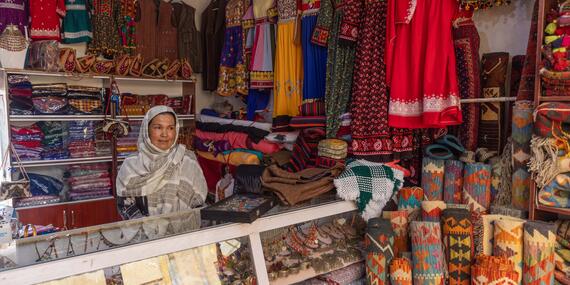Afghanistan: Helping women to thrive and prosper

"Working with the UN in Afghanistan is not only a lifeline for my livelihood, but also one of the few rays of hope for women around me,” said Noor,* who works as a Programme Analyst for a UN entity. She began her career as a national officer just four years ago, and since then she has swiftly progressed to her current role as a national officer, working on policy and governance, and overseeing the direct implementation of women’s projects.
In the past, these projects brought rural Afghan women’s cottage industries to scale. The women made carpets, handicrafts and jewellery, they were skilled in tailoring and embroidery, and they received donors’ support to sell their products across the country and region.
Before the de facto authorities took over in August 2021, the women sold their wares nationally through small and medium enterprises (SMEs). They also reached as far as Doha, Qatar, where they not only had wider markets at exhibitions but also access to raw materials. This gave them money, work and a sense of community in the business world.
But in August 2021, the women’s businesses were immediately shut down. For nearly six months they had no revenues from or avenues for work. It was a world of despair for the women, who were confined to their homes with nothing.
Noor’s UN entity and team worked with the women to revive their work and provide opportunities for digital education, such as learning English and taking computer classes. As the women’s businesses continue to slowly pick up, Noor estimates that their revenues have increased by 40 per cent since the takeover in August 2021.
Noor also had a chance to travel for her role, which is no mean feat in a country where women must be accompanied by a mahram (a male relative) both in Afghanistan and abroad. Her work with the UN has opened doors to learning and opportunities.
Noor explained: “I feel great when I come to the office, especially during field visits, where we collaborate with over 30 SMEs. The way women communicate and express their expectations regarding our work truly inspires me. The feeling is truly uplifting when we witness their optimism and hopefulness. They persist in their planning as if nothing has changed, and they consider the UN as their hope.”
Conversely, Noor’s passion for her work also stems from seeing her female cousins married at age 16 or 17. They now have between three and four children at an early age, and limited choices in life. But with a Bachelor’s degree in Business Administration, a Master’s degree in International Relations, and several years of work experience, Noor has vast options and opportunities.
She continues: “As I was growing up, I always aspired to be someone who could make a difference in the lives of others. The motivation behind this aspiration is the fact that in our country, it's often the women and girls who bear the brunt of every regime change and its consequences. Today, witnessing women thrive and prosper when provided with support is the most rewarding aspect of my work.”
*Name changed
